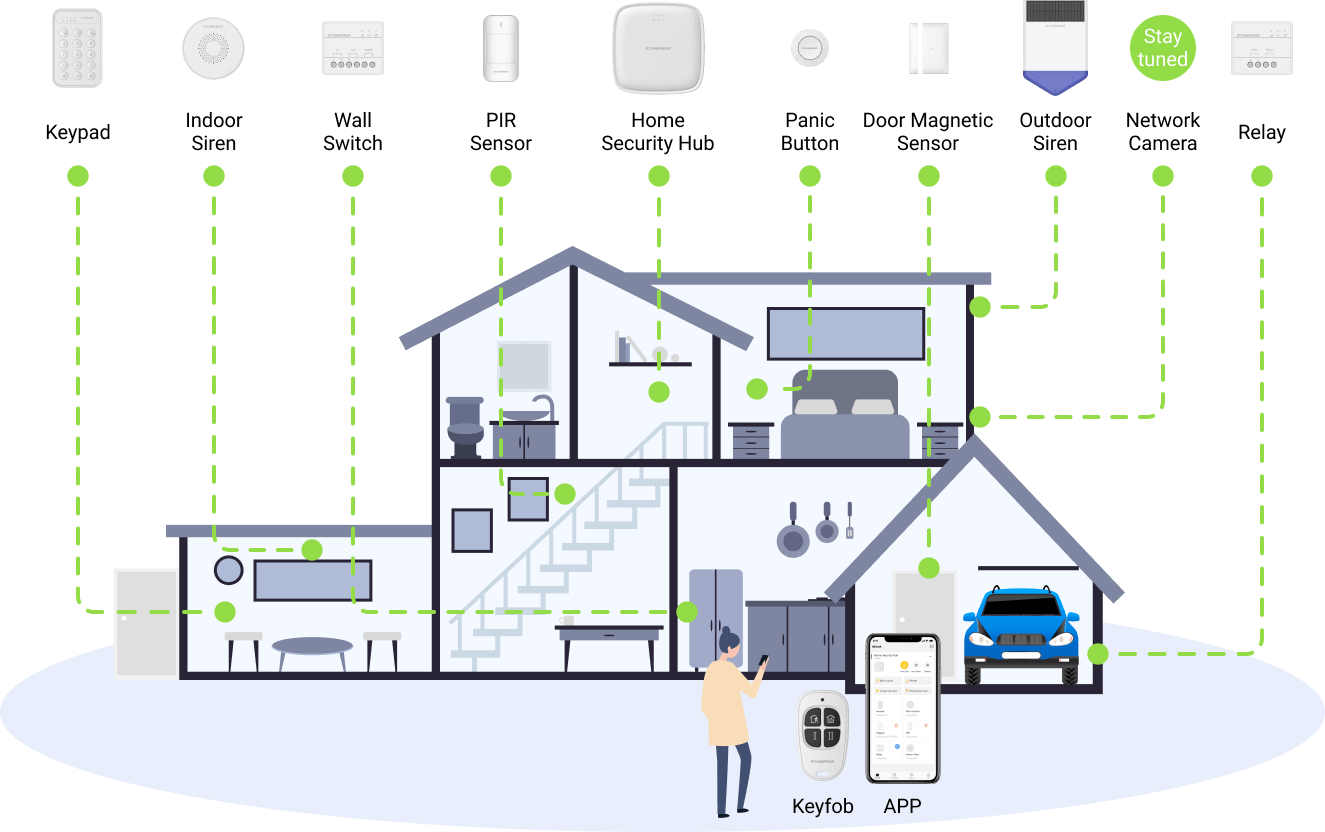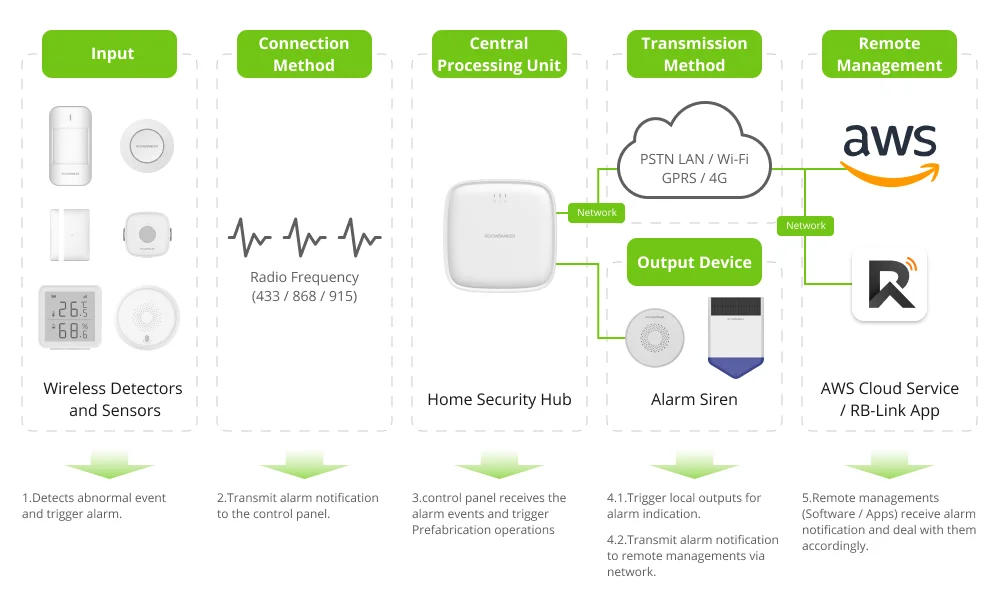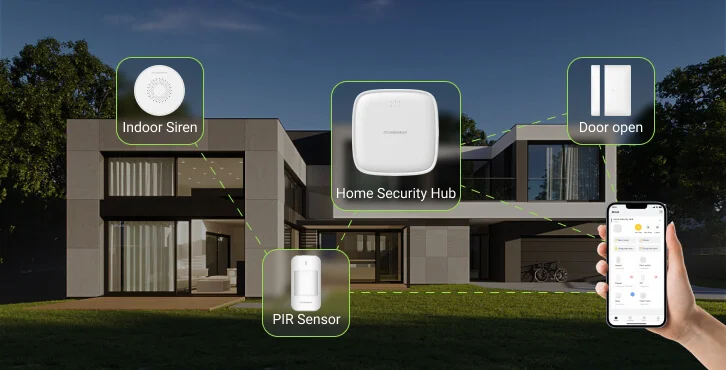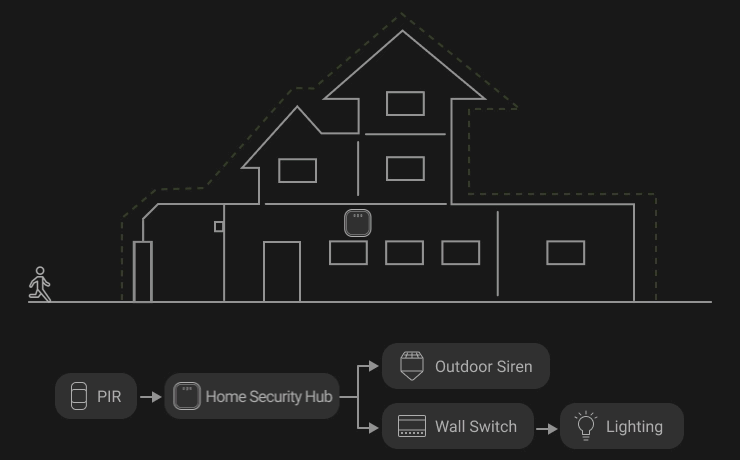For most of us, your home is not just a place, but a sanctuary that safeguards your most cherished possessions and the well-being of your loved ones. Our loved ones reside here, and we have our valuables in the houses.
Some may consider purchasing a quality homeowners insurance to protect homes. However, relying solely on homeowners insurance for protection may not be enough. After all, it only provides coverage after an incident has occurred.
How about taking proactive measures to prevent such incidents from happening in the first place? In today’s rapidly evolving technological landscape, investing in a reliable burglar intrusion alarm system might be a smarter solution.
If you are considering investing in these systems, you need to choose the right one depending on your security needs and budget. That is why we have compiled this article to discuss the different types of burglar alarm systems in order to simplify this decision-making process.
Central vs Local Burglar Alarms
Burglar alarm systems provide varying levels of security and response capabilities, but they generally fall into two major categories: local and central monitoring systems.
While both types can be effective and reliable at detecting intruders and deterring them, understanding their differences will help you choose the option that best suits your needs. Here we made a comparison chart to help you make informed decisions.
| Aspects | Local Burglar Alarm System | Central Burglar Alarm System |
| Initial cost | Typically lower upfront cost | Relatively higher upfront cost |
| Installation | DIY | Professional |
| Monthly monitoring fees | Optional | YES |
| Control | The user has full control over the entire system. | The user has limited control, the system is fully managed by the alarm company. |
| Professional monitoring | Optional | YES |
| Emergency response | It’s user’s diligence to judge the situations and decide if it’s necessary to contact authorities. | Alarm company contacts authorities. |
| Maintenance | Can be handled by users themselves | The alarm company may send staff to conduct regular checks multiple times a year |
| Alarm Receiving Reliability | Mobile app notification, some may provide SMS and phone call services. | Professional monitoring by the alarm company to increases reliability |
| Security | Prior to making a purchase, reading the product information to familiarize yourself with the data transmission mechanism and privacy policy of the burglar alarm system. | Professional monitoring enhances security by adding additional services. |
| False alarm handling | It is the responsibility of the users to handle it and free. | Alarm company handles false alarms, but you may be charged. |
| Scalability | User can add components easily as they need. | May require contacting the alarm company if you need to add more components |
Here is everything you need to know about the features of two main types of burglar alarm systems, and why each type matters:
Local Burglar Alarm System
Local burglar alarm systems, otherwise known as no-contract security alarm systems, are the most basic type of burglar alarm system available on the current market, often with a DIY installation.
The essential components of this system include perimeter sensors (such as window and door sensors, PIR motion sensors, glass vibration sensors, etc.,), home security hub, security cameras, and keyfob for security system. You can purchase each of these components individually or directly buying a complete home security kit.
When one component of the system is triggered/activated, the alarm siren will flash bright lights and emit a high-pitched, siren-like noise. This scares away the intruders and notifies the homeowner.

Since these alarm systems aren’t monitored by an alarm company, the local emergency services or law enforcement will not be automatically notified when an alarm is triggered. Instead, someone must see or hear the activated alarm and call the authorities by themselves.
These systems can also be used to detect water leaks and fires, which can be particularly vital if a fire breaks out when you are asleep.
Roombanker’s security alarm system is an example of both local and central alarm systems. Our systems are known for the following:
- The system uses ultra-long wireless RBF technology. It can extend 3500 meters, which is enough to cover entire house, apartment or retail establishments;
- The system is not associated with installation fees and monthly subscription fees. You only need to cover the upfront device cost;
- The system have a backup mechanism for both power and network interruption to enhance the security;
Features of Using Local Burglar Alarm Systems
- Inexpensive and affordable to most people: Once purchased, these systems have low costs associated with them as they are self-monitored.
- DIY installation: Local burglar alarm systems are easy to install and uninstall. You can also easily relocate them whenever necessary.
- Provide remote monitoring via mobile app: When triggered, these alarm systems can instantly notify homeowners not present at the premise via a security system mobile app notification, SMS, and phone calls.
- Record intruders: Local burglar alarm systems, such as Roombanker’s system will record any break-ins in the frame, giving you video evidence of the intrusion.
Central Station Burglar Alarm System
Central burglar alarm systems, also referred to as company-monitored systems are professionally installed and monitored by an alarm company 24/7. When this system is activated or triggered, a signal is automatically sent to the central monitoring station (alarm company).
From there, the alarm company will try to reach out to the homeowner and request a password. If the homeowner fails to respond or an incorrect password is provide, the central monitoring station (alarm company) will notify emergency services or law enforcement.
Since central station connect systems provide around-the-clock monitoring and response, they provide an added degree of security compared to local burglar alarm systems, which are self-monitored.
Features of Central Station Burglar Alarm Systems
- Immediate Assistance: A team of professionals ready to take appropriate action if an alarm is activated;
- More Complete Security: There is an additional third-party company that helps in monitoring and provide assistance once needed;
- More Service Options: As central monitoring services are provided by professional security company, they may have different level of services with different fees to serve customers.
- Higher Costs: It costs from a dozen to dozens of dollars per month, and a minimum one-year sign-up commitment is typically required.
Wired Vs Wireless Burglar Alarm system
How to install the burglar alarm system is an inevitable factor to consider when you are making a decision on whether to choose local or central station security alarm system.
Using wireless or wired burglar alarm system will influence a lot on user experience, such as home aesthetics (like drilling holes on your beautiful home walls), and ongoing maintenance cost (such as relying on third-party companies for regular checks or selecting a system with minimal maintenance requirements).

To assist you in making an informed decision, we also have prepared a helpful comparison chart below.
| Aspect | Wired Burglar Alarm system | Wireless Burglar Alarm system |
| Ease of installation | More work needed to install as it entails running cables and wires into floors and walls, which can be time-consuming and may need drilling and construction work. | Designed for easy installation. They do not need a lot of work on running of cables, making the installation less intrusive and more straightforward. |
| Cost of installation | Cost can be higher because of the need for professional installation and the associated cost of labour and materials needed for running wires. | They are typically cheaper as they usually allow for DIY installation. |
| Maintenance cost | A wired burglar alarm system typically relies on direct mains power, which can lead to significant maintenance fees in the event of any issues. | Wireless burglar alarm systems usually only require homeowners to change the battery every two or three years, with the batteries often being inexpensive cell batteries. |
| Portability | They are usually meant for permanent installation in a specific location. This makes them unsuitable for individuals planning to relocate or move. | They are inherently portable, making them suitable for homeowners and renters who frequently move. |
| Performance | They have traditionally been considered to be more reliable. However, the wireless systems technology has greatly evolved so there is little difference. | Their performance is as reliable as wired systems as long as you maintain them properly. |
| Aesthetics | By definition, these systems have more wiring and cabling which can be challenging to disguise. | Due to lack of cabling and wiring, these systems often appear much neater. |
What to Consider When Choosing the Right Burglar Alarm Systems for Your Spaces
Choosing the right burglar alarm system is crucial for both homes and retail businesses to ensure security. Here’s a guide on how to choose the right system for each:
For Apartments and Houses
- Assess your needs: Consider the layout of your home, the number of entry points, and your budget. You should determine if you need security sensors for doors, windows, or motion detection.
- Wireless vs. wired: You need to choose between wireless and wired systems. Wireless systems are easier to install and you can easily expand them. Wired systems are more reliable but may need professional installation.
- Monitoring options: You need to decide if you want a remotely monitoring system that alerts authorities in case of a break-in or a self-monitored system that notifies you directly.
- Features: We recommend looking for features such as remote access, smartphone app integration, and home automation compatibility for added convenience.
- Reputation and reviews: We recommend researching burglar alarm system providers and read customer reviews to gauge their reliability and customer satisfaction.
For Businesses (Retail Stores and Shops)
- Scalability: You need to consider the size of your shops and whether you need a system that can allow for expansion. You should look for systems with options for adding more sensors or cameras.
- Commercial-grade equipment: You should choose burglar alarm systems specifically designed for businesses, which often include features like more robust sensors and higher-resolution cameras.
- Integration with other security systems: If you have existing security measures such as CCTV cameras or access control systems, choose a burglar alarm system that can integrate seamlessly with them. This will allow for comprehensive security coverage.
- Compliance requirements: Depending on your industry and location, there may be specific regulations or insurance requirements for security systems. Therefore, be sure to choose a system that meets these standards.
Types of Burglar Alarm Detection Devices
Perimeter Protection Devices
Perimeter detection devices serve as the initial line of defense, securing the outer boundaries of properties. When breached, these devices trigger the alarm system, alerting occupants and detecting intruders before they can breach the property’s interior.
They include window and door magnetic switches (contacts), window foil, vibration detectors, screens and traps, etc., strategically placed to monitor fences, gates, and entry points.

Area Protection Devices
Area detection devices extend protection beyond the perimeter, surveilling interior spaces such as rooms, hallways, and corridors. These devices provide comprehensive coverage, ensuring swift intrusion detection and response.
Infrared devices, microwave devices, sonic and ultrasonic devices, photoelectric beams, etc. are commonly employed to detect unauthorized movement or sound within designated areas.
Object Protection Devices
Object detection devices focus on safeguarding valuable assets or specific items within a property. These devices utilize technologies such as RFID (Radio Frequency Identification), ultrasonic-sensors, vibration detectors, capacitance detectors, contact devices, pressure mats, etc. to monitor the presence or movement of objects of interest.
Home Alarm Control Panels
The home alarm control panel and transmission system serve as the central home security hub of the burglar alarm system. It is equipped with processors, communication modules, and user interfaces, to facilitate communication with monitoring centers or authorized personnel

Final Thought
If you are still unsure of what type of burglar alarm systems would be best for your home or business, or are looking for a reliable partner for all your home security needs, Roombanker can help! We are experienced in security alarm systems across a vast range of industries and are trusted by some of the world’s leading organizations.
Roombanker Wireless Security Alarm System combines ease of use with professional-grade features, offering effortless DIY installation and set up while integrating professional-grade features, including advanced detectors, a dedicated security hub, and supporting integration with Alarm Receiving Centres, etc, making it the go-to choice for a reliable wireless security alarm system, supporting intrusion alarm, fire & water leak alarm, panic alarm, etc., serving an array of small business and residential properties.
Our burglar alarm system features no contract, no monthly fees, suitable for promotion in your regions and countries. These wireless and locally-monitored systems are designed to provide peace of mind without the burden of excessive expenses.
We believe that every home should have access to its own reliable home security system, and we strive to make that a reality.
Contact Roombanker today to explore our offerings and take the first step towards fortifying your property’s security.
